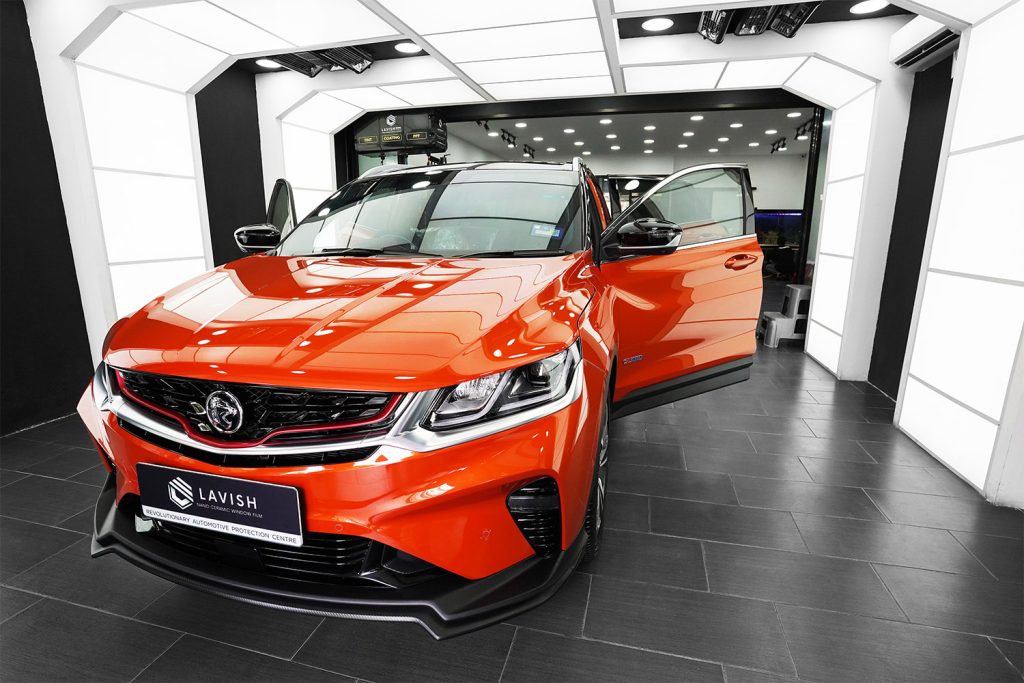
Car owners are always looking for ways to keep their vehicles looking new for as long as possible. Among the many car care products available, ceramic coatings have gained significant attention for their protective and glossy finish. Within this category, the term “9H Ceramic Coating” often stands out. It is marketed as a premium option, promising maximum durability and protection. But what exactly does 9H Ceramic Coating mean? Is it worth the investment? And how does it compare to regular ceramic coatings?
In this comprehensive guide, we will explain what 9H Ceramic Coating is, how it works, its benefits, the myths surrounding it, and the facts you need to know before making a decision.
What is 9H Ceramic Coating?
Ceramic coating is a liquid polymer that bonds chemically with a car’s paint surface to create a protective layer. It is usually made using silicon dioxide, also known as SiO₂, which hardens upon curing and creates a glossy, hydrophobic surface.
The “9H” in 9H Ceramic Coating refers to the highest rating on the pencil hardness scale, a standard test in the paint and coating industry that measures scratch resistance. A 9H rating means that the cured coating can resist scratches from a pencil with 9H hardness, making it tougher than softer coatings. It does not mean the coating is indestructible, but it does mean it is among the hardest and most durable coatings available for automotive use.
This type of coating is designed to provide a strong barrier against environmental contaminants, UV rays, and minor abrasions, while giving the paint a deep and long-lasting shine.
What is the 9H Test for Ceramic Coatings?
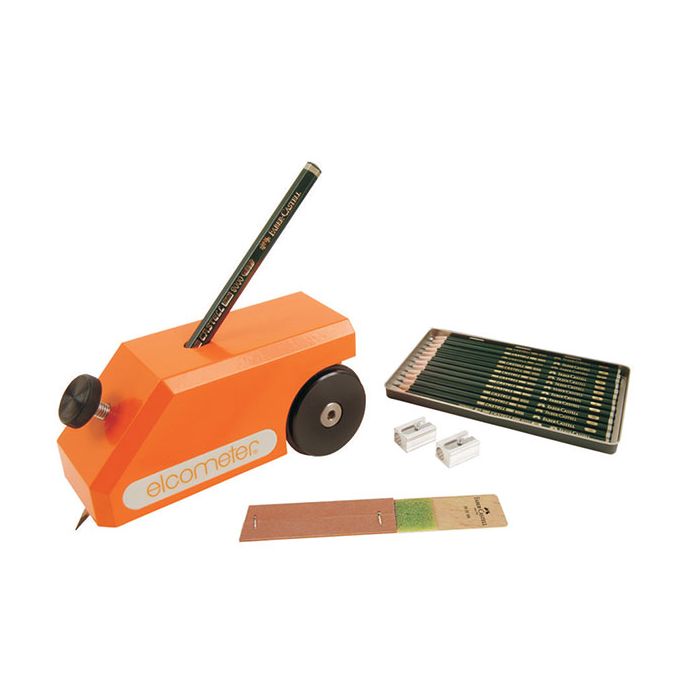
The term 9H comes from a specific type of scratch resistance measurement known as the pencil hardness test. According to IGL Coatings, this test is the ASTM-standard method for determining how resistant a coating is to scratches. The pencil hardness test is preferred over mineral hardness scales such as Mohs because it is designed specifically for thin films like automotive coatings.
In the pencil hardness test, the cylindrical pencil lead is maintained at a constant angle of 45° and exerts a force of 7.5N (1.68 lbF) against the coating’s surface, ensuring a standardized and reliable measurement of hardness. The scale ranges from 9B, which is the softest, to 10H, which is the hardest. The letter “H” refers to hardness, while “B” refers to the softness and blackness of the pencil lead. When a coating has a 9H rating, it means that after full curing, it can resist scratching from a pencil of 9H hardness or any grade below it.
How 9H Ceramic Coating is Applied
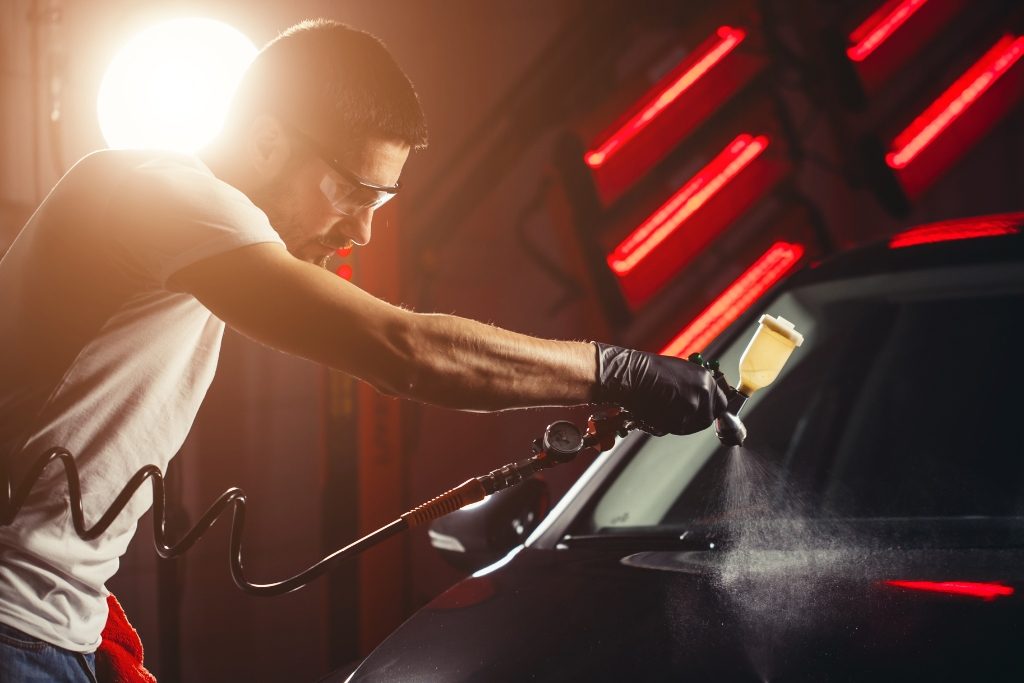
Applying 9H Ceramic Coating is a detailed process that requires precision and the right tools. The durability and appearance of the final result depend heavily on proper preparation and application techniques. At Lavish, advanced technology such as professional-grade spray guns is used to ensure an even, flawless coating that adheres perfectly to the vehicle’s surface.
Step 1: Surface Preparation
The vehicle undergoes a thorough wash to remove dirt, dust, and residues. This is followed by a decontamination process using clay bars to eliminate embedded particles that standard washing cannot remove.
Step 2: Paint Correction
Before coating, the paint is carefully corrected to remove swirl marks, light scratches, and oxidation. This step is essential because any imperfections left behind will be sealed under the coating and become more visible.
Step 3: Coating Application with Spray Gun Technology
Lavish uses advanced spray gun technology to apply the 9H Ceramic Coating. This method ensures a uniform layer that covers every contour of the vehicle with precision. The fine mist created by the spray gun allows for a smoother finish compared to traditional hand application, reducing the risk of streaks or uneven spots.
Step 4: Curing Time
Once applied, the coating needs time to cure and achieve its maximum hardness. Depending on the product and environmental conditions, this can take 12 to 48 hours. At Lavish, professional infrared curing systems are often used to speed up this process and enhance the coating’s durability.
9H Ceramic Coating vs Standard Ceramic Coating
Many car owners want to know if there is a real difference between 9H Ceramic Coating and a standard ceramic coating. The main differences are in hardness, durability, performance, and cost.
| Feature | 9H Ceramic Coating | Standard Ceramic Coating |
| Hardness Level | Achieves the highest rating on the pencil hardness scale, offering maximum scratch resistance for light abrasions. | Typically rated at 6H or 7H, providing good protection but less resistance to micro-scratches. |
| Durability | Can last three to seven years with proper care, depending on conditions and maintenance. | Usually lasts one to three years before reapplication is needed. |
| Gloss and Finish | Maintains a deep, glossy shine for longer due to superior resistance to oxidation and UV damage. | Offers a glossy finish but may lose shine faster when exposed to harsh conditions. |
| Cost | Higher initial cost due to advanced formulation and extended lifespan, often offset by reduced maintenance over time. | Lower cost but may require more frequent reapplication and upkeep. |
| Best Use Case | Perfect for owners seeking premium, long-term protection and showroom-quality appearance. | Suitable for budget-conscious owners or vehicles in less demanding environments. |
Benefits of 9H Ceramic Coating
Despite some misconceptions about what 9H hardness means, quality 9H Ceramic Coatings do offer significant benefits for vehicle protection and maintenance.
A) Long-Lasting Paint Protection
9H Ceramic Coating offers strong protection against UV rays, oxidation, and chemical stains from bird droppings, tree sap, and acid rain. This helps prevent fading and surface deterioration.
B) Scratch Resistance
The hardness provides resistance against light scratches and swirl marks from washing or daily use. While it cannot stop all scratches, it significantly reduces the risk of minor abrasions.
C) High Gloss and Shine
The coating enhances paint depth and reflectivity, giving a mirror-like finish that lasts for years with proper care.
D) Easier Cleaning
Its hydrophobic properties cause water to bead and roll off, carrying dirt with it. This makes washing quicker and less labor-intensive.
E) Preserves Resale Value
A well-maintained paint finish improves resale value. The coating keeps the car looking newer for longer, which can appeal to potential buyers.
Common Myths About 9H Ceramic Coating Debunked
Myth 1: “It Makes Your Car Scratch-Proof”
This is the most damaging misconception about 9H ceramic coating. While it does provide scratch resistance, it’s not scratch-proof. The coating can prevent light swirls from improper washing techniques and minor brushes against bushes, but it won’t stop a key, shopping cart, or deliberate scratching from causing damage.
Myth 2: “It’s Permanent Protection”
No ceramic coating is truly permanent. Environmental factors, washing frequency, and storage conditions all affect longevity. Most professional-grade 9H ceramic coatings last between 2–5 years, with some premium options claiming up to 7 years under ideal conditions. Eventually, the coating will degrade and require reapplication.
Myth 3: “You Never Need to Wash Your Car Again”
While 9H Ceramic Coating makes cleaning faster and easier due to its hydrophobic properties, it does not eliminate the need for regular washing. Dirt, dust, and contaminants will still accumulate on the surface, and routine maintenance is essential to preserve gloss and performance.
Myth 4: “9H Means Harder Than Anything Else”
The 9H rating refers to the pencil hardness test, not to hardness against all materials. This scale measures resistance to scratches from pencil-grade leads, not the hardness of metals or glass. While 9H is among the hardest coatings available for automotive use, it is not indestructible.
How Much Does 9H Ceramic Coating Cost?
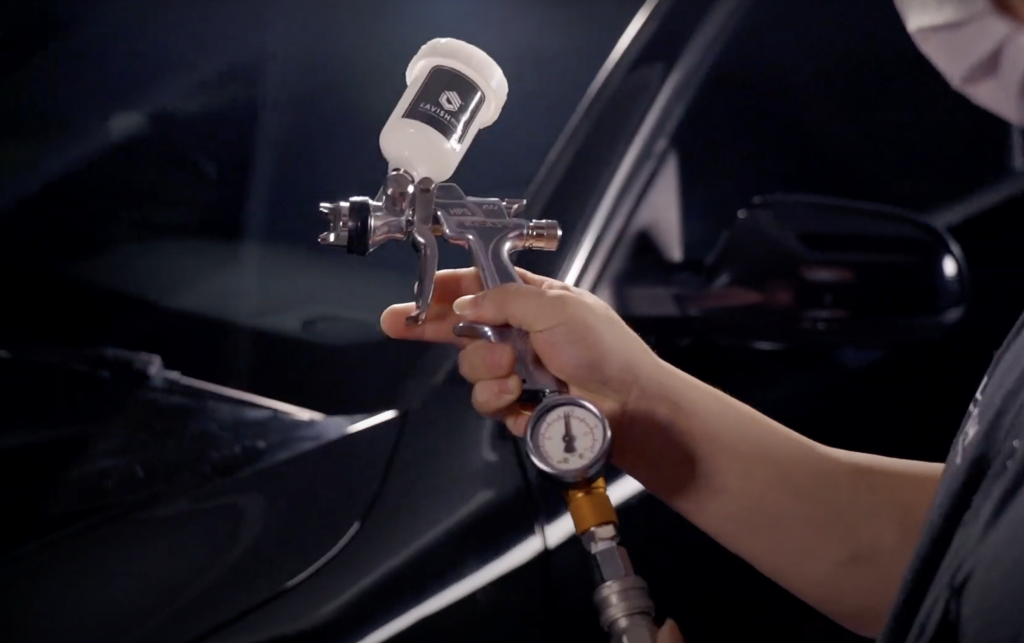
In Malaysia, the cost of 9H ceramic coating generally ranges between RM 1,500 and RM 2,800, with the exact price depending on the size of the vehicle and the level of preparation required; smaller sedans tend to be on the lower end of the range, while larger SUVs or luxury models can reach the higher end, and prices often include professional surface preparation, paint correction, and multi-layer application to ensure maximum durability and gloss.
At Lavish, our Eco Bonz 9H Ceramic Coating costs only RM 1,499 and includes full body paint coating, window coating, sport rim, and interior coating. The Crystal Gloss 9H Ceramic Coating is priced at RM 1,999 and also includes full body paint coating, window coating, sport rim, and interior coating. For maximum protection, the Multi Quartz 9H Ceramic Coating costs RM 2,799 and covers full body paint coating, window coating, sport rim, headlight, and interior coating, providing up to 7 years of protection. Click here to check out the packages.
Is 9H Ceramic Coating Worth It?
Whether 9H Ceramic Coating is worth it depends on your goals. If you value long-lasting protection, a deep glossy finish, and easier maintenance, it can be a smart investment. Although the upfront cost is higher than waxing or a standard coating, the reduced upkeep and extended durability often make it worthwhile.
For car enthusiasts or those who want to maintain showroom condition, the benefits justify the price. For older or less frequently used cars, a lower-grade ceramic coating or wax may be more practical.
Conclusion
9H Ceramic Coating is one of the most advanced paint protection options available. It provides exceptional durability, a brilliant gloss, and strong resistance to common environmental threats. The 9H rating comes from the pencil hardness test, a standardized method that measures a coating’s scratch resistance. While impressive, it is just one factor to consider when evaluating a coating’s performance.
By understanding what 9H really means and how it is tested, you can make an informed decision that balances cost, performance, and maintenance. Choosing a reputable product and installer, combined with proper care, will ensure your vehicle remains protected and beautiful for years.
Explore Lavish® Dumo Nano Ceramic Crystal Coating
Lavish® Dumo Nano Ceramic Crystal Coating provides long-lasting protection for your vehicle’s exterior, effectively shielding the paint from premature fading and maintaining its vibrant appearance for longer. This innovative shield not only prevents minor scratches on your clear coat but also serves as a sacrificial layer, thus preserving the original factory paint.
Utilizing advanced nanotechnology, ceramic nanoparticles penetrate the smallest pores in the paint, creating a shiny, smooth, and extremely slick or hydrophobic surface. This significantly reduces surface tension, effectively preventing environmental contaminants like bird droppings, bugs, dirt, and graffiti paint from adhering. The coating’s self-cleaning effect means that water can easily remove dirt by encapsulating it and rolling off the surface.
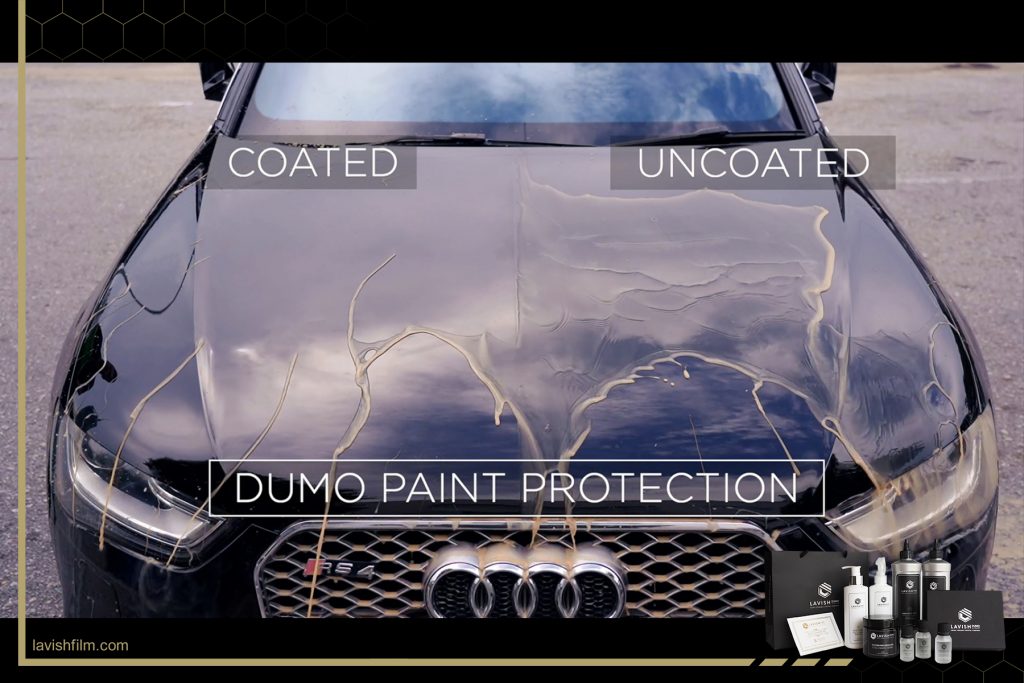
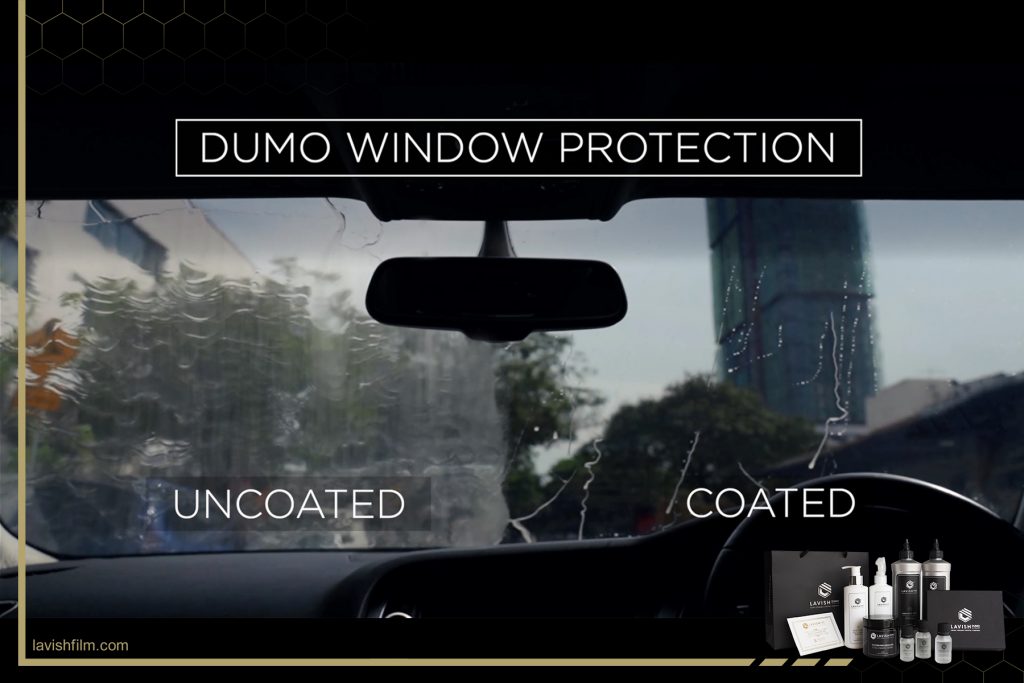
Lavish® Dumo Nano Ceramic Crystal Coating offers:
– 9H Ceramic Crystal Clear Coating
– Advanced Air Pneumatic Spray Gun Applying Technology
– Permanent Bond Technology
– Up to 7 Years Protection
– Manufactured in Japan
– UV & Thermal Resistance
– Hydrophobic Effect for Easy Clean Up
– Anti-Graffiti & Surface Protection
– Recognized and certified by leading institutions, including SGS, TÜV SÜD, IQA, and WCPCC
Lavish’s commitment to professional installation guarantees a precise and durable application, making it an excellent choice for those seeking the best in car coating.
So, what are you waiting for? Contact us today to learn more about our services!
FAQs
1. What is 9H ceramic coating?
9H ceramic coating is a liquid polymer applied to a vehicle’s paint that cures to form a strong, durable protective layer. The “9H” refers to the highest rating on the pencil hardness scale, indicating exceptional resistance to light scratches and micro-abrasions. It also offers UV protection, hydrophobic properties, and a glossy finish that enhances the car’s appearance.
2. What is the difference between 9H coating and regular ceramic coating?
9H coating generally has a higher hardness rating, offering greater scratch resistance compared to standard ceramic coatings, which may be rated 6H or 7H. 9H coatings tend to last longer, provide enhanced gloss retention, and resist environmental damage better, though they are usually more expensive.
3. What is the best 9H ceramic coating for cars?
The best choice depends on your needs, budget, and application method. Premium options, like Lavish® Dumo Nano Ceramic Crystal Coating, offer up to 7 years of protection, advanced application technology, and certification from reputable testing institutions, making them ideal for long-term protection and gloss.
4. How long does 9H ceramic coating last?
With proper care, a high-quality 9H ceramic coating can last between 3 to 7 years. Factors like product quality, installation method, environmental conditions, and maintenance habits will influence its lifespan.
5. How to maintain 9H ceramic coating?
Maintenance involves regular washing using pH-neutral car shampoo, avoiding abrasive cleaning tools, and performing periodic inspections. You should also avoid automatic car washes with harsh brushes. Some owners opt for annual maintenance coatings to refresh hydrophobic properties.
6. What are the benefits of 9H ceramic coating?
Benefits include superior scratch resistance, protection from UV damage and oxidation, enhanced gloss and color depth, easier cleaning due to hydrophobic properties, and longer-lasting paint protection compared to wax or sealants.
7. Does 9H ceramic coating make a car completely scratch-proof?
No. While it offers excellent resistance to light scratches and swirl marks, it cannot prevent deep scratches from sharp objects or heavy impacts.
8. Can 9H ceramic coating be applied at home?
While DIY kits exist, achieving the best results usually requires professional application, as proper surface preparation and curing are crucial for durability and appearance.